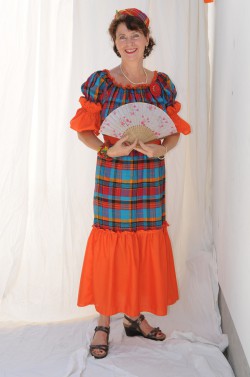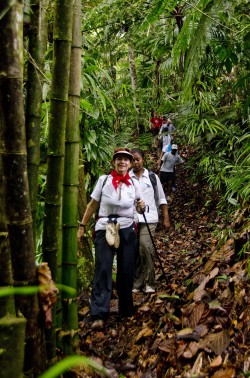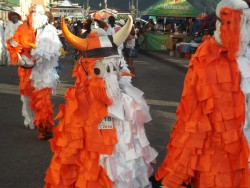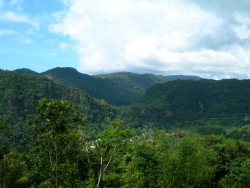- Home » Expat Articles » Interviews » Canadian Expat Living in Dominica - Interview with Gwenith
Canadian Expat Living in Dominica - Interview with Gwenith
| Published: | 29 Jul at 9 AM |
Want to get involved?
Become a Featured Expat and take our interview.
Become a Local Expert and contribute articles.
Get in touch today!
Become a Local Expert and contribute articles.
Get in touch today!
Filed: Interviews,Dominica
Gwen relocated to Dominica, West Indies in the late 1990's. This rainforest paradise is a tiny, lush country located between the French Overseas Departments of Guadeloupe and Martinique in the Eastern Caribbean. She moved to this self-proclaimed Nature Island, as she was suffering from severe environmental health challenges and wished to have an improved quality of life. She is better able to manage her health here, as there is abundant clean air, food and water.
She has always enjoyed writing and her hobby has definitely blossomed in these practically-pristine surroundings. Her background in library and information science has proved helpful with research and information gathering for her literary creations. Her life-long love of reading continues on the Nature Island, and she still enjoys finding a wide variety of old-fashioned 'paper' books at the lovely and historic Roseau Public Library. As a trained singer, she has been fortunate to meet other musicians of like mind who share her interest in this performing art. As long as Gwen is able to avoid chemical irritants such as perfume, she can sing reasonably well when they occasionally offer their talents as a group in support of charitable organizations.
Because this Canadian expat has spent over 15 years getting to know her adopted country, Dominica, she is thrilled to write a blog, Ti Domnik Tales (www.gwenithwhitford.com) about some of her experiences on this somewhat remote, stunningly beautiful, rainforest island in the Caribbean. Gwenith's expat blog is called Ti Domnik Tales (see listing here)

Gwendominica enjoys celebrating Creole Day, which is an annual cultural extravaganza of Dominica's traditional fashion, food, language and history.
Where are you originally from?
I am originally from Canada.
In which country and city are you living now?
I live near Roseau, the capital city of Dominica.
How long have you lived in Dominica and how long are you planning to stay?
I have lived here for about 17 years! I can't believe I have been here on the Nature Island for that length of time. The years have flown by in this tropical paradise. I don't know if I could ever completely "leave" Dominica. However, I do have to consider health and financial concerns as I get older. Ideally, I would wish to be able to have the best of both worlds for part of each year, that is 6 months each in Canada and Dominica.
Why did you move to Dominica and what do you do?
I moved here for health reasons. I am severely challenged with environmental health issues, including multiple chemical sensitivities, multiple heavy metal poisoning, inhalant, food and drug allergies, chronic fatigue syndrome and fibromyalgia. Dominica offers plentiful clean air, local, natural and some organic foods, and spring water from uncontaminated sources. I occupy myself primarily with my writing about Dominica in various capacities, I do a little singing with a small group and I enjoy hiking and other outdoor activities in the mountains. I also devote a lot of time to managing my health. I benefit from regular physiotherapy from a French osteopath and German physiotherapist who reside here. There are also hot springs, mountain rivers and the Caribbean Sea for additional therapeutic aids.
Did you bring family with you?
I came alone, after having spent some time going back and forth to Canada to see if I could live here by myself. While there have been occasional challenges, I was blessed to have the constant companionship of a little cat named Tia-pet. He was given to me by another expat who was returning to the U.K. shortly after I arrived on-island. This little kitty and I shared 16 wonderful years together. He recently died (May 2014)and I miss him terribly. He was very special and added to the quality of my life in Dominica. I am not ready for a new family member yet.
How did you find the transition to living in a foreign country?
Admittedly, there was a large learning curve at first. However, I was determined to give expat life a good try, as my health is considerably improved on the Nature Island. I always kept the voices of Canadian expat friends Susan and Dennis, who live in Bequia, St. Vincent and the Grenadines, West Indies in my head. They long ago advised me that patience and a sense of humor would go a long way in terms of self-preservation while living in foreign surroundings. Life definitely has a slower pace here, except for the driving!
Was it easy making friends and meeting people; do you mainly socialise with other expats?
Initially, I tended to socialize with other Canadians, as well as American and British expats. Most of the people I first met have since returned to their homelands. I really do not socialize too much due to my health challenges and limited energy levels. However, I do have a few good friends, both expat and Dominican. As well, I have taken French classes at the Alliance Francaise here and have expanded my circle of friends and acquaintances to include French-speaking Europeans. I really enjoy the diversity of cultures that are present on this small island.

There is nothing like a hike in Dominica's rainforest. I just love it! This photo was taken during Hike Fest,an annual event organized by the Dominica Hotel and Tourism Association.What are the best things to do in the area; anything to recommend to future expats?
As I have noted repeatedly, Dominica is referred to as the Nature Island, for good reason. Hiking and diving are huge claims to fame here. As well, fun-filled cultural events such as Carnival and the World Creole Music Festival are well worth it. Birding, whale and turtle watching are also popular activities. You will find out more when you read my blog, 'Ti Domnik Tales' which is featured on the ExpatsBlog.com website.
What do you enjoy most about living in Dominica?
I enjoy most having better health and an improved quality of life due to Dominica's natural attributes: clean air, food and water. The rainforest always intrigues me. In that locale, the air is so pure that it reminds me of breathing with an oxygen tank, except that this is the real thing! I do love the warm weather too, as I have always been cold intolerant (typical Canadian!).
How does the cost of living in Dominica compare to home?
For me, it depends on the strength of the Canadian dollar. The Eastern Caribbean dollar is pegged against the U.S.dollar at 1 USD = ca. 2.67 ECD. Imported good are expensive as they are heavily taxed. Thankfully, fruits and vegetables, eggs, fish and local chicken are normally plentiful, which helps with lower food costs. It really depends on what the individual wants and can afford: I live fairly frugally in a rental apartment which is spacious, bright, airy and has a great view. However, a house purchase would not be possible on my limited budget. Properties are expensive, but this is paradise, after all! Also, it is costly to travel in/out of Dominica as there are no direct flights from North America or Europe at this time.

Mountain chicken frogs are extrememly rare on Dominica due to a fungal disease. Thankfully, international, regional and local scientists are working hard to save them from becoming extinct!What negatives, if any, are there to living in Dominica?
I always find this a difficult question to answer because it really depends on the individual - and we are all different! If one is short on patience and cannot see the humor in a situation, or if one thinks that their own way of doing things is better than the local way, it might be best to just come on a holiday and then return home! It is really what you make of it - an open mind and warm heart do help, as well as a smattering of caution and a willingness to accept differences. The idea of personal space is different here, so boundaries may be overstepped sometimes, as far as foreigners are concerned.
Health care is not up to standards in developed countries, so if you have supplemental medical insurance in case you need it, so much the better for you!
If you could pick one piece of advice to anyone moving to Dominica, what would it be?
DO NOT just read about Dominica, including all the wonderful things I've written about it and decide to move here the next day. Also, one visit is not enough to know if island life is for you. Be careful - it may not be for you and it may take time to figure that out. You will only find that out if you spend some time here, return home, and perhaps come back for longer periods. Living here is not the same as being a tourist and you want to be sure that it suits you before you make the big jump.
What has been the hardest aspect to your expat experience so far?
For me, the sometimes solitary aspects of my existence can occasionally trouble me. But that might happen to me in Canada too, due to the restrictions of my unusual health conditions. I am a social person by nature, so my writing, as well as singing, French lessons and hiking with friends can alleviate some of the loneliness. In this culture, few women live alone without family nearby, so I might be considered somewhat 'different', for a variety of reasons. I also had to learn to better define my personal boundaries so that I would not become a victim of occasional opportunists.
When you finally return home, how do you think you'll cope with repatriation?
It could be challenging, but it will also be fun! I recently returned from a 5 week visit to Canada (Jun/Jul 2014). What really amazed me was the incredible advance in all aspects of technology. While Dominica is fairly up-to-date in terms of telecommunications, I was astounded that all areas of business are digitally influenced now. I'll be a bit behind, but I am a willing learner. I also know that many people who have not spent time (apart from a holiday) in a foreign culture will likely not relate to me very well. But that's okay - I am already accustomed to distance from some because of my unusual health challenges. There are so many wonderful things about Canada: I will continue to enjoy them, even after a long time away. My positive attitude is already in place!
What are your top 5 expat tips for anyone following in your footsteps?
Ti Domnik Tales is a personal blog about many of my positive experiences and adventures in Dominica. It also features some personalities who inspire me. I started Ti Domnik Tales in March 2012 and have written over 100 posts. I've also received over 40,000 visits from interested readers and followers as of July 2014 and I am absolutely delighted. Stay tuned for more! ; )
How can you be contacted for further advice to future expats coming to your area?
I prefer not to be personally contacted as we all do/see/experience things differently. I could only offer my own perspective, which may not be yours. Please glean what you can from my blog and also refer to detailed websites such as: www.discoverdominica.com and www.avirtualdominica.com and for news, www.dominicanewsonline.com Thank you!
She has always enjoyed writing and her hobby has definitely blossomed in these practically-pristine surroundings. Her background in library and information science has proved helpful with research and information gathering for her literary creations. Her life-long love of reading continues on the Nature Island, and she still enjoys finding a wide variety of old-fashioned 'paper' books at the lovely and historic Roseau Public Library. As a trained singer, she has been fortunate to meet other musicians of like mind who share her interest in this performing art. As long as Gwen is able to avoid chemical irritants such as perfume, she can sing reasonably well when they occasionally offer their talents as a group in support of charitable organizations.
Because this Canadian expat has spent over 15 years getting to know her adopted country, Dominica, she is thrilled to write a blog, Ti Domnik Tales (www.gwenithwhitford.com) about some of her experiences on this somewhat remote, stunningly beautiful, rainforest island in the Caribbean. Gwenith's expat blog is called Ti Domnik Tales (see listing here)

Gwendominica enjoys celebrating Creole Day, which is an annual cultural extravaganza of Dominica's traditional fashion, food, language and history.
Here's the interview with Gwenith...
Where are you originally from?
I am originally from Canada.
In which country and city are you living now?
I live near Roseau, the capital city of Dominica.
How long have you lived in Dominica and how long are you planning to stay?
I have lived here for about 17 years! I can't believe I have been here on the Nature Island for that length of time. The years have flown by in this tropical paradise. I don't know if I could ever completely "leave" Dominica. However, I do have to consider health and financial concerns as I get older. Ideally, I would wish to be able to have the best of both worlds for part of each year, that is 6 months each in Canada and Dominica.
Why did you move to Dominica and what do you do?
I moved here for health reasons. I am severely challenged with environmental health issues, including multiple chemical sensitivities, multiple heavy metal poisoning, inhalant, food and drug allergies, chronic fatigue syndrome and fibromyalgia. Dominica offers plentiful clean air, local, natural and some organic foods, and spring water from uncontaminated sources. I occupy myself primarily with my writing about Dominica in various capacities, I do a little singing with a small group and I enjoy hiking and other outdoor activities in the mountains. I also devote a lot of time to managing my health. I benefit from regular physiotherapy from a French osteopath and German physiotherapist who reside here. There are also hot springs, mountain rivers and the Caribbean Sea for additional therapeutic aids.
Did you bring family with you?
I came alone, after having spent some time going back and forth to Canada to see if I could live here by myself. While there have been occasional challenges, I was blessed to have the constant companionship of a little cat named Tia-pet. He was given to me by another expat who was returning to the U.K. shortly after I arrived on-island. This little kitty and I shared 16 wonderful years together. He recently died (May 2014)and I miss him terribly. He was very special and added to the quality of my life in Dominica. I am not ready for a new family member yet.
How did you find the transition to living in a foreign country?
Admittedly, there was a large learning curve at first. However, I was determined to give expat life a good try, as my health is considerably improved on the Nature Island. I always kept the voices of Canadian expat friends Susan and Dennis, who live in Bequia, St. Vincent and the Grenadines, West Indies in my head. They long ago advised me that patience and a sense of humor would go a long way in terms of self-preservation while living in foreign surroundings. Life definitely has a slower pace here, except for the driving!
Was it easy making friends and meeting people; do you mainly socialise with other expats?
Initially, I tended to socialize with other Canadians, as well as American and British expats. Most of the people I first met have since returned to their homelands. I really do not socialize too much due to my health challenges and limited energy levels. However, I do have a few good friends, both expat and Dominican. As well, I have taken French classes at the Alliance Francaise here and have expanded my circle of friends and acquaintances to include French-speaking Europeans. I really enjoy the diversity of cultures that are present on this small island.

There is nothing like a hike in Dominica's rainforest. I just love it! This photo was taken during Hike Fest,an annual event organized by the Dominica Hotel and Tourism Association.
As I have noted repeatedly, Dominica is referred to as the Nature Island, for good reason. Hiking and diving are huge claims to fame here. As well, fun-filled cultural events such as Carnival and the World Creole Music Festival are well worth it. Birding, whale and turtle watching are also popular activities. You will find out more when you read my blog, 'Ti Domnik Tales' which is featured on the ExpatsBlog.com website.
What do you enjoy most about living in Dominica?
I enjoy most having better health and an improved quality of life due to Dominica's natural attributes: clean air, food and water. The rainforest always intrigues me. In that locale, the air is so pure that it reminds me of breathing with an oxygen tank, except that this is the real thing! I do love the warm weather too, as I have always been cold intolerant (typical Canadian!).
How does the cost of living in Dominica compare to home?
For me, it depends on the strength of the Canadian dollar. The Eastern Caribbean dollar is pegged against the U.S.dollar at 1 USD = ca. 2.67 ECD. Imported good are expensive as they are heavily taxed. Thankfully, fruits and vegetables, eggs, fish and local chicken are normally plentiful, which helps with lower food costs. It really depends on what the individual wants and can afford: I live fairly frugally in a rental apartment which is spacious, bright, airy and has a great view. However, a house purchase would not be possible on my limited budget. Properties are expensive, but this is paradise, after all! Also, it is costly to travel in/out of Dominica as there are no direct flights from North America or Europe at this time.

Mountain chicken frogs are extrememly rare on Dominica due to a fungal disease. Thankfully, international, regional and local scientists are working hard to save them from becoming extinct!
I always find this a difficult question to answer because it really depends on the individual - and we are all different! If one is short on patience and cannot see the humor in a situation, or if one thinks that their own way of doing things is better than the local way, it might be best to just come on a holiday and then return home! It is really what you make of it - an open mind and warm heart do help, as well as a smattering of caution and a willingness to accept differences. The idea of personal space is different here, so boundaries may be overstepped sometimes, as far as foreigners are concerned.
Health care is not up to standards in developed countries, so if you have supplemental medical insurance in case you need it, so much the better for you!
If you could pick one piece of advice to anyone moving to Dominica, what would it be?
DO NOT just read about Dominica, including all the wonderful things I've written about it and decide to move here the next day. Also, one visit is not enough to know if island life is for you. Be careful - it may not be for you and it may take time to figure that out. You will only find that out if you spend some time here, return home, and perhaps come back for longer periods. Living here is not the same as being a tourist and you want to be sure that it suits you before you make the big jump.
What has been the hardest aspect to your expat experience so far?
For me, the sometimes solitary aspects of my existence can occasionally trouble me. But that might happen to me in Canada too, due to the restrictions of my unusual health conditions. I am a social person by nature, so my writing, as well as singing, French lessons and hiking with friends can alleviate some of the loneliness. In this culture, few women live alone without family nearby, so I might be considered somewhat 'different', for a variety of reasons. I also had to learn to better define my personal boundaries so that I would not become a victim of occasional opportunists.
When you finally return home, how do you think you'll cope with repatriation?
It could be challenging, but it will also be fun! I recently returned from a 5 week visit to Canada (Jun/Jul 2014). What really amazed me was the incredible advance in all aspects of technology. While Dominica is fairly up-to-date in terms of telecommunications, I was astounded that all areas of business are digitally influenced now. I'll be a bit behind, but I am a willing learner. I also know that many people who have not spent time (apart from a holiday) in a foreign culture will likely not relate to me very well. But that's okay - I am already accustomed to distance from some because of my unusual health challenges. There are so many wonderful things about Canada: I will continue to enjoy them, even after a long time away. My positive attitude is already in place!
What are your top 5 expat tips for anyone following in your footsteps?
- Come with the expectation that it will be a challenge to relocate in many respects. But if you really want to do it, and you have an open mind and tolerant heart, then certainly it will be worth it!
- Test the waters several times - for increasing lengths of time, until you are sure that this is the right move for you. It's different from being a tourist: the honeymoon period normally lasts about 6 months. After that, reality tends to set in.
- Always be respectful but be cautious too. You are on unfamiliar ground. Take time to get used to it. If something doesn't seem right in your gut, then it definitely isn't right for you. Don't ignore that little voice in your head. Respect yourself too!
- Single women of any age: You will no doubt get a lot of attention and admiration. Be appreciative, but be firm. Don't be swayed by seemingly genuine adoration. Be mindful of uncomfortable situations. If it doesn't feel right, get out fast! Relationships can be very different from what one may have experienced in developed countries.
- This is their culture - not yours. If you think it's better where you come from, then best not to be here. It could cause you a lot of misery, if you are not willing to be flexible and tolerant. Be open to new things. Living in a different culture can be rich and rewarding if you accept and respect the differences around you. Of course, some things may not sit well with you. In that case, it is best to clearly avoid those situations.
Ti Domnik Tales is a personal blog about many of my positive experiences and adventures in Dominica. It also features some personalities who inspire me. I started Ti Domnik Tales in March 2012 and have written over 100 posts. I've also received over 40,000 visits from interested readers and followers as of July 2014 and I am absolutely delighted. Stay tuned for more! ; )
How can you be contacted for further advice to future expats coming to your area?
I prefer not to be personally contacted as we all do/see/experience things differently. I could only offer my own perspective, which may not be yours. Please glean what you can from my blog and also refer to detailed websites such as: www.discoverdominica.com and www.avirtualdominica.com and for news, www.dominicanewsonline.com Thank you!
Grab a featured expat badge that links to this interview!
 Copy and paste code to display the Featured Expat Badge:
Copy and paste code to display the Featured Expat Badge:Comments » No published comments just yet for this article...
Feel free to have your say on this item. Go on... be the first!


 Gwenith is a Canadian expat living in Dominica. Blog description: Stories, articles, reflections, musings about Dominica, the Nature Island
Gwenith is a Canadian expat living in Dominica. Blog description: Stories, articles, reflections, musings about Dominica, the Nature Island





